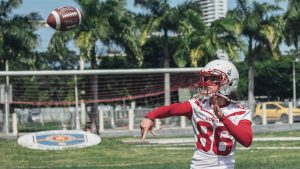- Free Consultation: 760-571-5500 Tap Here to Call Us
Athletes in Escondido May Have Brain Injuries Without Obvious Symptoms

Sports-related concussions and other types of traumatic brain injuries (TBIs) caused by contact sports have received significant attention in the last decade after numerous athletes showed signs of chronic traumatic encephalopathy (CTE). In response to the high rate of brain trauma among youth athletes and professional athletes in contact sports in particular, researchers began engaging in in-depth studies surrounding football and head injuries. According to a recent study conducted at the University of Michigan, high school football players may have concussion biomarkers after taking a hit to the head without showing obvious symptoms.
This new research could help to prevent additional injuries among high school athletes, and it could ensure that youth football players receive the medical treatment and rest they need after suffering a mild TBI, even if they are not showing symptoms of a concussion.
Symptoms of Concussions May Not be Enough to Assess Likelihood of a TBI
According to Dr. Jacob Joseph, a neurosurgery resident at Michigan Medicine who was the lead author of the new study, “in high school football players, there is biochemical evidence of brain injury after a single high-impact hit to the head, even when the athlete is asymptomatic.” In other words, a youth football player might take a hit to the head, show absolutely no obvious signs of a concussion to the coach or athletic trainer, and the athlete might go back onto the field with a serious head injury. The results of the study were published in the Journal of Neurosurgery.
The University of Michigan Health Lab noted that, although coaches and athletic trainers now “talk with the athlete and determine if the player will sit out the rest of the game” after the player sustains a hit or bump to the head, “this might not be enough.” To be sure, “the subtle symptoms of head trauma can elude coaches and players alike.” This study is the first of its kind to suggest that there are biomarkers for brain injury even when symptoms do not appear to allow for a concussion diagnosis.
Continuing to Play Football After a Head Injury can Have Disastrous Results
It is extremely important for football players of all ages, but especially youth athletes, to stop playing after sustaining a head injury. Coaches and athletic trainers already have some difficulty keeping players off the field after a hit to the head because players lie about their symptoms or simply fail to report them. Going back onto the football field after a concussion—even if the player does not have symptoms and does not realize that he or she has been concussed—can have devastating results. The injury can alter the player’s ability to concentrate and focus in the long run, and the head injury could have lifelong consequences.
This new research could change the way that coaches and athletic trainers handle hits to the head among players. While there is still a substantial amount of research to be done on the topic, the research ultimately could allow players to know if they have brain injury biomarkers after taking a hit to the head with a simple blood test on the sidelines. In the meantime, the authors of the study urge coaches and athletic trainers to take a player out of the game when there is a hit to the head, regardless of whether the player shows signs of a concussion.
Contact an Escondido Brain Injury Attorney
If your child sustained a TBI while playing youth sports, you may be able to file a claim. An Escondido brain injury attorney can help. Contact the Walton Law Firm to discuss your case in more detail.
See Related Blog Posts: FDA Approves New Blood Test to Detect Concussions More Than Concussions Cause CTE, New Study Says
(image courtesy of joao victor xavier)









